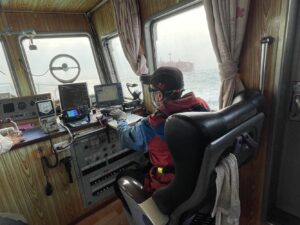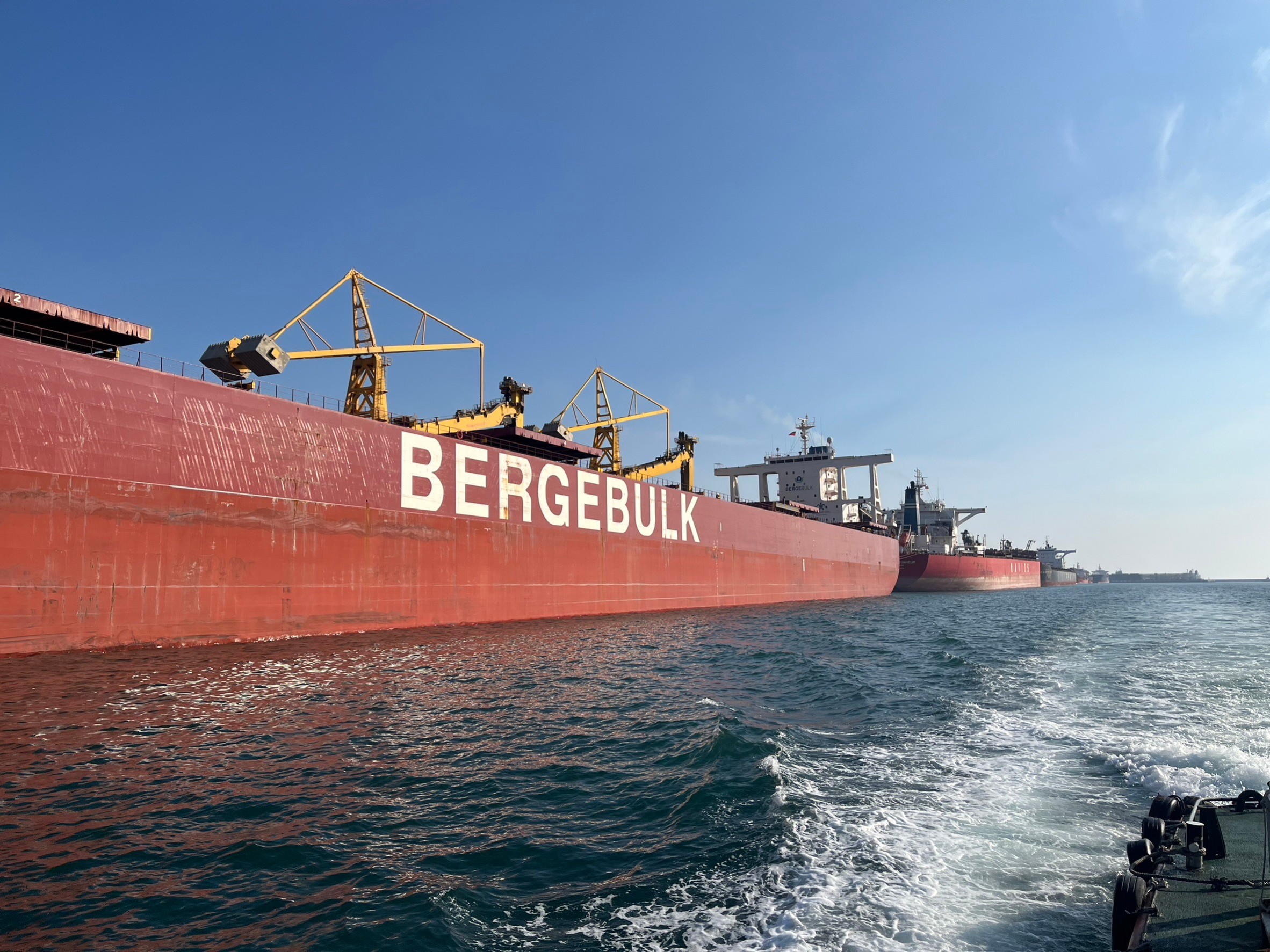Reporters/Chia-Ying Lin, Chih-Wen Lin, Chen-Rong Wu
Taiwan is strategically located at the intersection of Mainland China, Northeast Asia, the Pacific, and Southeast Asia, with a vast coastline and natural harbors, making its geographical location important. The Taiwan Strait is also one of the busiest shipping routes in the world. Countless ships enter and leave Taiwan’s ports every day, and the complex terrain presents many challenges for ships from other countries. Thus, maritime pilots also known as “harbor captains” play a crucial role as port guardians, ensuring the safe entry and exit of ships and avoiding accidents.
Maritime pilots are mainly responsible for guiding large ships in and out of ports, rivers, or canals. Therefore, they need to have professional skills and knowledge to monitor various weather conditions, water flow conditions, and tide changes, so as to make accurate guidance decisions. In addition, they need to be familiar with the characteristics of various ships, such as their length, width, and draft, to provide ships’ captains with correct guidance. In other words, it is the duty of the maritime pilots to navigate ships of all sizes through busy ports to dock. One tiny mistake could lead to an irredeemable disaster.
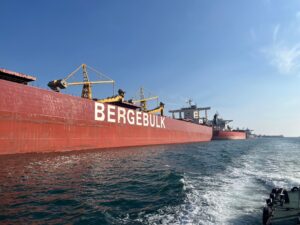
Certificates are Difficult to Obtain
To become a “maritime pilot” or “harbor captain” in Taiwan is a far more arduous process than one could imagine. According to the pilot exam regulations, there are two types of exams (A and B), which include written and oral tests, physical fitness tests and a bilingual interview. The five subjects tested are local port details, maritime regulations, pilotage, ship handling, and professional English. However, there are no relevant books for “local port details,” and pilots must rely on information collection or they have to ask local pilots to gain an understanding of the conditions of a specific port. In addition, once a port is chosen for examination, it cannot be rescheduled to another one unless there is a retake. Familiarizing oneself with the terrain and climate of a port requires a lot of time and effort. Arbitrary rescheduling can result in the maritime pilots not being familiar with the port, leading to pilotage errors.
Physical test requires climbing a 9-meter rope ladder within 60 seconds to test the maritime pilots’ boarding skills. The final stage is a bilingual interview in which the examiner will test the applicants of their familiarity with the specific port they are applying for and whether they possess professional English oral skills. Additionally, maritime pilots must be under 50 years old and have at least three years of experience as ship captains on vessels of 3,000 tons or more.
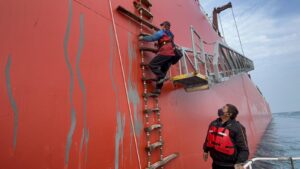
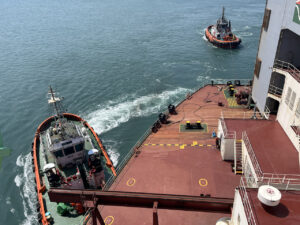
Guardians of Harbor Security
Maritime pilots or harbor captains take the ship safely into and out of the port in accordance with the application of the ship agent every day. When receiving the order, maritime pilots will first take the pilot boat to the side of the big ship, climb the pilot ladder to the ship, and then go to the bridge to guide the ship into the port smoothly. “Our work is actually very simple, but there are countless tricks. It goes without saying that the job of a maritime pilot is not without swells and waves. The size of vessels and weather conditions are variables that make no two days alike,” said Capt. Sun of Mailiao Harbor based in Yunlin County, southern Taiwan. According to Sun, the number of boats varies every day, ranging from three or four to seven or eight, and the size of the boat will also affect the distance to the sea. The larger the ship that enters the port, the higher the risk, and the distance to the sea will be farther for the maritime pilots to reach. Sun added that boarding a small boat is more dangerous than that of a large ship, because a small boat cannot keep off the wind, and the more swaying the hull, the more difficult it is for the maritime pilots to board the boat. After boarding the ship, maritime pilots serve as advisors to the captains of the ship or boat. Sun underscored, “Our job is to give advice to the captain, we will not touch any equipment on the ship. The captain has the final decision.” Although maritime pilots must bear criminal responsibility, not compensation, in the event of a ship grounding or a collision, they work closely with the captains to ensure a smooth port entry.
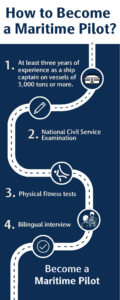
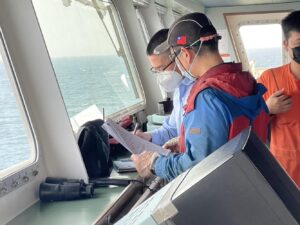
Taiwan not Protected by International Law
Every country has its own water diversion systems and thresholds for those who aspire to become maritime pilots. Take Taiwan as an example, Taiwanese maritime pilots require years of experience and have to take rigorous national examinations before they are eligible to become maritime pilots. Japan and Australia have pilot schools; thus, people who are willing to do this job, regardless of nationality, can directly take the tests and obtain certificates; while Hong Kong allows seafarers to take the maritime pilot exam when they are chief mates. In Singapore and China, maritime pilots are public servants who have to take the national examination. Compared to other countries, Taiwan’s threshold is much higher, but the experience of maritime pilots and the system are relatively sound and complete.
In addition, although there is a set of international legal norms to protect maritime pilots and maritime business in various countries, since Taiwan cannot join the United Nations due to sovereignty issues, it is not protected by international maritime pilot laws. In this regard, Sun said that although Taiwan is not a member of the United Nations, in order to follow the international footsteps, when a new system is formulated, Taiwan will adjust its internal regulations, so as to protect the rights and interests of its maritime pilots.
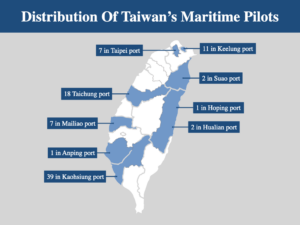
High Risk Job
Although maritime pilots enjoy commendable salaries, they often find themselves in a working environment with high pressure. Sun pointed out that if a maritime pilot who led the freighter to enter or clear the port made a wrong judgment call and the freighter got stranded or hit the harbor wall by accident, even causing an oil spill, he will not only be punished by administrative law, but will also be afflicted with conscience for causing a marine ecological catastrophe. Immense pressure also exists during the maritime pilots’ boarding time, even to the extent of endangering their lives. Sun added that sometimes the gale was too strong for him to grab the ladder tightly. He recalled there was a pilot who lost his footing, broke his leg, suffered from hypothermia because of falling into the sea, and died eventually in the fatal accident.
Environmental factors also greatly increase the danger of work for maritime pilots. Usually, winter is the season that blows the strongest wind in Mailiao Harbor, but because of floating on the sea, maritime pilots aren’t aware that the vessel is being pushed by the wind unconsciously, such that it could drift and get stranded or hit the harbor wall. On the contrary, typhoons in summer could trigger the swell. When the swell approaches the bank, coupled with the submarine topographical change, it would turn into huge waves; thus, the risk of maritime pilots boarding the ship would be increased. Fortunately, with enough experience, Sun knew how to predict the size of the wind, and help make the vessel stay on an accurate spot in case it was pushed into the wrong place, leading to an irreparable consequence.
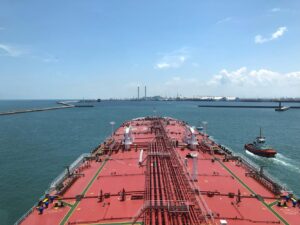
Sun has worked as a marine pilot or harbor captain for many years. But in fact, he has been prone to seasickness when he was a child, so it’s a big challenge for him to work on the sea. He not only has to stay concentrated all the time, but also has to overcome physical illness. Sun said, “I told myself I need to adapt and get used to seasickness.” He refused to take any seasickness medicine, so as not to rely on medicine, which will inevitably lead to some side effects. Eventually, he adapted to the environment and overcame the nauseous feeling by his strong willpower.
Despite the pressure and risks as marine pilots, harbor captains are well compensated and well acclaimed by many. With the support of his family, Sun was able to persevere and devote most of his time to perfecting the skill as a maritime pilot over troubled water for years. Since pilotage operation is relevant to Taiwan’s overall economic and trade interests, as skilled professionals in navigation, maritime pilots assist the captains in the smooth import and export of domestic and foreign products. This job requires precision in pilotage, quick decision making, and minimum human error. Even a small collision with other vessels at the harbor can damage the side of the vessel and cause huge environmental damage. Thus, one can say that the job of a maritime pilot is both fulfilling and fraught with danger.
